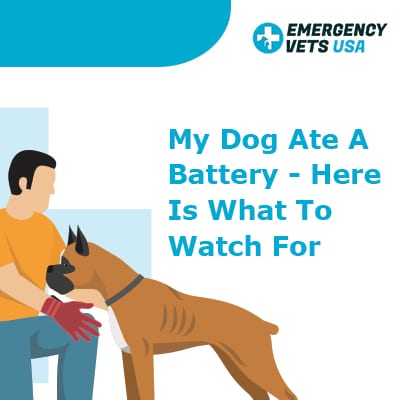Dog Ate A Battery, Now Here Is What To Watch For
Few aspects of dog ownership are as anxiety-provoking as finding that your dog has eaten something they shouldn’t have.
The things that a dog decides to try to eat can be truly astonishing.
A TV remote or flashlight may not seem very tasty, but that doesn’t mean that your dog won’t eat it.
Eating any foreign object comes with the risk of bowel or intestinal blockage or rupture, but eating things that have toxins can be even more dangerous.
Unfortunately, batteries are both significant obstruction risks and packed with toxic materials.
While most dogs probably won’t choose to eat a battery, some dogs do. Reported cases are increasing as more battery-powered devices fill our homes.
Here is what you need to know if your dog ate batteries.

What Happens When A Dog Eats A Battery
It is conceivable, even likely, that your dog could swallow a battery whole and have the entire battery pass through their system without doing any damage.
Batteries are rugged and made to resist puncture.
If a larger dog ate a small battery without chewing on it much first and it didn’t lodge in their throat, it may pass through their system without incident.
However, if the battery is punctured, becomes stuck, or tears something, your dog could be in much more danger. The types of risk depend on the types of battery.
Most Common Batteries Eaten By Dogs
Alkaline Dry Cell Batteries
These are the types of batteries used to run toys, flashlights, and various other household items.
They use a corrosive material, like potassium hydroxide or sodium, to generate current and produce electricity.
If an alkaline battery is punctured, the corrosive material may leak out, injuring the skin or flesh that it contacts.
Disc style batteries may become lodged in the esophagus.
Even if they aren’t punctured, they may cause burns via electrochemical effect.
Lithium Disc Batteries
These batteries aren’t corrosive, but they are extremely dangerous if lodged in your dog’s esophagus.
The electrochemical effects can create a rapid reaction, decaying your dog’s esophagus and even perforating it.
Just 15 minutes of contact between your dog’s esophagus and a 3-volt lithium battery can threaten your dog’s life.
Battery Casings
Both types of batteries may use several different metals as casing.
These heavy metals present their own risks to your dog.
Lithium, silver, zinc, and lead can all result in heavy metal toxicity.
Most of the time, dogs pass batteries quickly enough that few metals have time to seep out and affect your dog.
However, if batteries or battery pieces remain lodged for more than a few days, metal toxicity may occur.
Other Dangers of Batteries
Besides the special risks of being batteries, these foreign bodies carry the same risks as any inappropriate item for your dog to ingest:
Choking
If your dog tries to swallow a battery but it doesn’t go down, it could block airflow and your dog could choke.
Aspirating
Some batteries, like hearing aid batteries, are so tiny that dogs can inhale them, causing damage or infection.
Obstruction
Batteries can be stuck anywhere in the digestive tract, blocking further digestion and giving batteries time to break down, releasing heavy metals.
Perforation
The smooth shape of most batteries makes perforation slightly less likely than many foreign objects.
However, it is still possible that a battery could tear your dog’s intestinal lining or colon.
What To Do If Your Dog Chews On A Battery
If you catch your dog chewing on a battery, don’t panic.
- Take away the battery. Naturally, the first thing that you will do is take away the battery. Some dogs will willingly give it up. Other dogs may try to swallow it before you get it. You know your dog best. If you think that your dog might try to keep the battery away from you or swallow it, tempt them to drop the battery with a delicious treat
- Check the battery for signs of wear and puncture. Has your dog bitten the battery? Is it just dented, or is it punctured? Be careful not to get any battery acids on yourself while you are checking the battery.
- How many batteries were there? Find out where your dog found the battery. Most devices use at least two batteries. Determine if there are any missing.
- Did your dog eat anything else? If your dog was ripping up a device, try to find out if all of the device’s components are present or if your dog might have swallowed something else.
If you suspect that your dog ingested or punctured a battery, call your veterinarian or an emergency veterinarian immediately.
Tell them what has happened. They may recommend that you bring your dog in for observation or treatment or they may tell you to observe your dog yourself, depending on the circumstances.
If you are very confident that your dog did NOT puncture or swallow a battery: Encourage your dog to drink a lot of water and observe them for the next 48-hours to be sure that they didn’t injure their mouths on the battery.
What Makes Batteries So Dangerous?
Clearly, the chemical makeup and small size of batteries are hazardous to our dogs, but plenty of objects may be small and toxic.
What makes batteries so particularly dangerous for your dog?
They Are Everywhere
Even if you find out that your dog ate batteries, you may have a hard time figuring out exactly where they got them.
Our lives are full of gadgets, and many of those gadgets run on batteries.
Everything from children’s toys to remote controls use batteries.
They are even more ubiquitous during holidays when they run various decoration gadgets around the house.
They Are Often Housed In Things That Are Attractive To Your Dog
Dogs love to rip things up and get to what is inside.
It is many a dog’s primary pursuit in life to remove the squeaker from their squeaky toys.
A battery may be housed inside a fluffy toy, glittery decoration, or something with fun mouth feels, like a remote.
When your dog rips apart the object, getting the battery inside feels like a prize.
They Have Unique Toxicity
Batteries can do a lot of damage just with contact to your dog’s esophagus, and they have entirely different toxicity if they remain in the digestive tract.
This means they have multiple ways of hurting your dog.
Symptoms To Watch Out For If Your Dog Ate A Battery
If you believe that your dog has eaten a battery, it is essential that you get them to a veterinarian immediately.
Still, it is important to be aware of the symptoms of battery poisoning.
You may notice these symptoms when you have no idea that your dog has eaten a battery.
Knowing what to look for could save your dog’s life.
Most symptoms appear within a few hours of ingestion, although some dogs may not show signs for up to 12 hours or even longer.
- Grayish black material adhered to the teeth, on the gums, and generally present in the mouth shows that enough battery fluid has been released to have corrosive effects
- Redness on lips and gums
- Grayish material in the mouth
- Coughing, retching, and gagging
- Shortness of breath or gasping for air
- Wheezing or whistling when breathing
- Vomit that is the texture of coffee grounds
- A fever
- Blood in stool
Treatment For Dogs Eating Batteries
Treatment depends on the type of battery and how much of it the dog has been exposed to.
Dogs that have not swallowed, but only slightly licked or chewed the battery, are less likely to suffer serious consequences.
With your veterinarian’s recommendation, these dogs may be monitored at home.
Wash your dog’s mouth and surrounding skin with warm water.
Remember to wash the paws as well, since dogs usually hold something that they are chewing in place with their paws.
Observe your dog for signs of drooling or pawing at the mouth or indications of general pain or discomfort.
Dogs who have not swallowed the battery but did chew it extensively are more at risk.
Your veterinarian will likely recommend that you bring your dog in because they may need supportive care.
Clear liquids and soft diets may be prescribed for some time.
Your dog also may benefit from stomach protectants and pain medication. Antibiotics may be beneficial, especially if there has been tissue damage.
Dogs who have swallowed batteries need immediate care.
An X-ray or other imaging can confirm that the battery was swallowed and pinpoint its location in your dog’s digestive tract.
Endoscopy or surgery may be performed to remove the battery or its pieces. Blood work should be done before surgery is performed.
Generally, endoscopy will push the battery or pieces further down into your dog’s stomach where they can be surgically removed.
It is important that endoscopy is performed rapidly.
Batteries can rapidly damage the esophagus if they remain lodged for more than a few minutes.
Flushing your dog’s throat with standard tap water has been shown in research to be a good way to reduce damage from lithium batteries.
Flushing should occur within the first 30 minutes.
Flush your dog’s throat thoroughly with water as soon as you discover that they have swallowed a battery. Flush on the way to the vet as well if you have a long drive.
How Can I Keep My Dog From Eating Batteries?
You, of course, want to keep your dog from eating something that could hurt them, like batteries.
Only store batteries where your dog can’t reach them. Keep tools and decorations with batteries away from your dog.
If you suspect that you may have trouble keeping batteries away from your dog, consider keeping your dog in a crate or designated room when you leave the home or can’t supervise.
References For Further Reading:
- Household Batteries
- Battery Poisoning in Dogs
- Battery ingestion in dogs
- https://europepmc.org/article/med/9682401
- https://europepmc.org/article/med/10509426
- Button batteries pose ‘deadly’ risk to toddlers

Leslie Brooks graduated from the University of Tennessee College of Veterinary Medicine in 2012. After graduation she moved to Indianapolis to do an intensive one-year internship at a specialty practice and then began working as a small animal general practitioner. She ran her own house call practice for three years, visiting pets in people’s homes. Currently, she works part time in clinical practice and volunteering her free time to serve pets of the homeless. Read more about us here.
